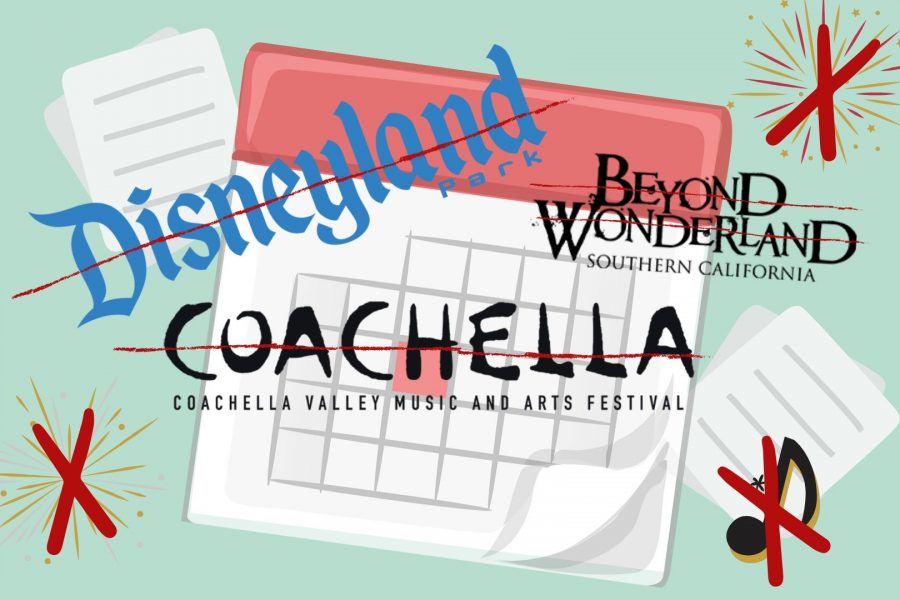Coronavirus is unavoidable—if not the virus itself, then the preventative actions and media coverage that have infiltrated every corner of our lives.
First, it was the doomsday shopping panic that culminated in a shortage of toilet paper, hand sanitizer and wet wipes. With a rising number of cases in the U.S., more drastic changes have since been implemented to flatten the curve, from shelter-in-place mandates and temporary business closures.
But the effects of the viral outbreak don’t stop there; aside from literal death, people’s entire lives have been put on hold, with major events and daily activities like school both being cancelled or postponed as a preventative measure. This response to the unfolding coronavirus outbreak has resulted in not just a shortage of toilet paper and pantry staples, but of pop culture, too.
In an attempt to mitigate the spread of the virus, Gov. Gavin Newsom has officially banned social gatherings of over 250 people earlier this week, and has called for distances of six feet apart between people at smaller ones. That effectively prevents the potential virus cesspools that are Coachella and Beyond Wonderland from occurring any time soon.
Mt. SAC alumna and regular Coachella attendee Talin Hakopyan, 24, said, “It’s really unfortunate that Coachella has been postponed, but I feel more at ease knowing that in October we’ll be able to enjoy the event without worrying about COVID-19. The safety of attendees, performers and employees are a paramount.”
Also among the growing list of entertainment casualties are concerts, including all planned shows at Goldenvoice-owned venues, all Broadway shows and a handful of movie premieres, including the new James Bond film “No Time to Die” and, tragically, “Peter Rabbit 2.” Devastating.
The cancellations are hitting Southern California especially hard. Los Angeles is not only one of the nation’s leading cultural hubs, but one of the few cities that have already postponed its upcoming Pride weekend, originally planned for June. Disneyland, which draws in crowds of nearly 50,000 every day, is slated for closure throughout the rest of March among the emergence of coronavirus cases in Orange County.
The preventative measures have even affected homebodies practicing social distancing by halting the production of Grey’s Anatomy, Riverdale and most late night talk shows, which will be showing reruns for the rest of the month. Talk show hosts such as Jimmy Fallon and Conan O’Brien have already resorted to self-filmed monologues, but without a live audience and the theatrics of soundstage, they don’t quite hit the spot.
Similarly, the cancellation of film industry gatekeepers like SXSW and Tribeca Film Fest, which create buzz for new releases and foretell what the Oscar season will look like, will put the movie release schedule behind.
While postponing raves and film premieres might seem like small, luxurious potatoes compared to border lockdowns, travel bans and the actual sickness itself—and I agree wholeheartedly—these cancellations signify a pause on pop culture.
In a world where art has traditionally allowed us to reflect and critique our society, as well as escape it altogether with the magic of world-building, the topic of coronavirus has been so pervasive and widespread that it is stripping us of our livelihood—arts and entertainment, that is.
Though the virus has inspired its share of hilarious memes and SNL skits, coronavirus has put more of a damper on pop culture than anything. In the same way that COVID-19 is steering us towards a recession—the bulk of which civilians will soon feel—the virus is also setting us up to be behind in the arts.
We already live in a world where the fine arts and humanities, the backbone of human decency and expression, are often regarded as nothing more than unemployment-guaranteeing general elective requirements taken on the road to a STEM degree. But it’s in art and pop culture that we are our most human.
Through film, TV, music and stage, pop culture is a pillar of our lives that can transcend even the starkest differences of opinion. They say a common interest in Star Wars is thicker than water.
To many, art is a collective experience. It’s a live concert. It’s sitting in the theater and watching stories unfold. No matter what form of entertainment you subscribe to, whether it be TV, film, music or sports, it feels as though culture – the thing that we go home to and binge-watch in hopes of forgetting the cruelty of the world – has been put on hold altogether.
New developments are being made every day, with public opinion ranging from “no big deal” to mass hysteria, but it looks like the virus has taken its latest victim: our livelihood.


